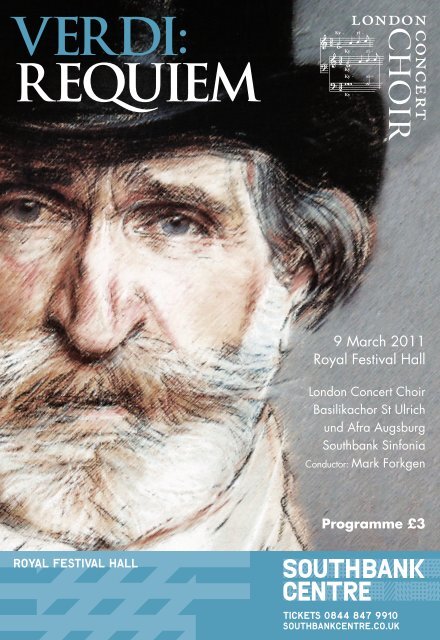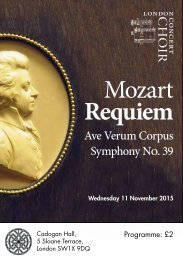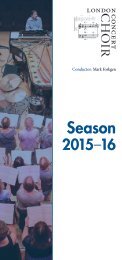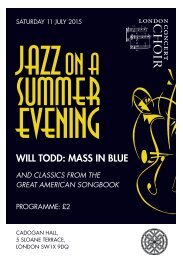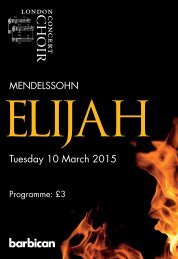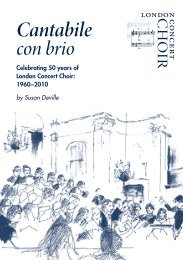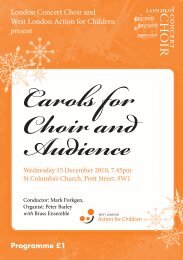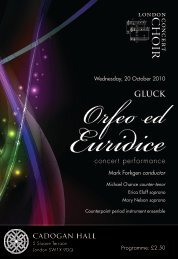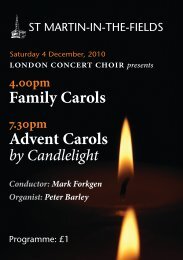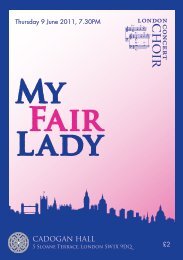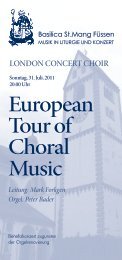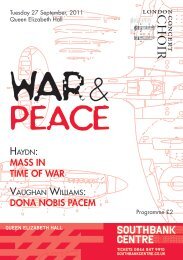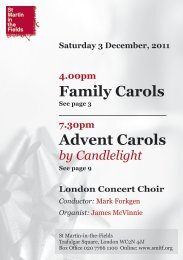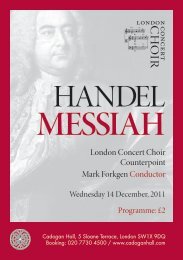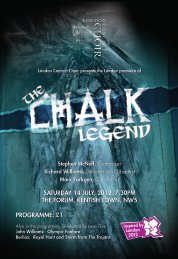You also want an ePaper? Increase the reach of your titles
YUMPU automatically turns print PDFs into web optimized ePapers that Google loves.
VERDI:<br />
REQUIEM<br />
9 <strong>March</strong> <strong>2011</strong><br />
Royal Festival Hall<br />
London Concert Choir<br />
Basilikachor St Ulrich<br />
und Afra Augsburg<br />
Southbank Sinfonia<br />
Conductor: Mark Forkgen<br />
Programme £3<br />
Programme £3
Welcome to Southbank Centre and we hope you enjoy your visit.<br />
We have a Duty Manager available at all times.<br />
If you have any queries please ask any member of staff for assistance.<br />
During the performance:<br />
• Please ensure that mobile phones, pagers, iPhones and alarms<br />
on digital watches are switched off.<br />
• Please try not to cough until the normal breaks in the music<br />
• Flash photography and audio or video recording are not permitted.<br />
Eating, drinking and shopping? Southbank Centre shops and restaurants include<br />
Riverside Terrace Café, Concrete at Hayward Gallery, YO! Sushi, Foyles, EAT,<br />
Giraffe, Strada, wagamama, Le Pain Quotidien, Las Iguanas, ping pong,<br />
Canteen, Caffè Vergnano 1882, Skylon and Feng Sushi, as well as our shops<br />
inside Royal Festival Hall, Hayward Gallery and on Festival Terrace.<br />
If you wish to contact us following your visit please contact:<br />
Head of Customer Relations<br />
Southbank Centre<br />
Belvedere Road<br />
London SE1 8XX<br />
or phone 020 7960 4250<br />
or email customer@southbankcentre.co.uk<br />
We look forward to seeing you again soon.<br />
Programme Notes by Terry Barfoot<br />
Programme Design by Stephen Rickett of MasterPage Ltd (stephen.rickett@masterpage.net)<br />
Programme edited by Eleanor Cowie<br />
© London Concert Choir <strong>2011</strong><br />
www.london-concert-choir.org.uk<br />
London Concert Choir - A company limited by guarantee, incorporated in England<br />
with registered number 3220578 and with registered charity number 1057242.
Wednesday 9 <strong>March</strong> <strong>2011</strong><br />
Royal Festival Hall<br />
VERDI<br />
REQUIEM<br />
Mark Forkgen conductor<br />
London Concert Choir<br />
Basilikachor St Ulrich & Afra, Augsburg<br />
Southbank Sinfonia<br />
Claire Seaton soprano<br />
Jean Rigby mezzo soprano<br />
Peter Auty tenor<br />
Alan Ewing bass<br />
Please note that there will be no interval in this concert
The members of London Concert Choir are delighted to welcome<br />
our visitors from Germany, the Basilikachor St. Ulrich und Afra<br />
Augsburg with their Music Director Peter Bader, to sing with us in<br />
this performance of <strong>Verdi</strong>’s magnificent <strong>Requiem</strong>.<br />
We also warmly welcome His Excellency the German Ambassador<br />
and Mrs Boomgaarden, together with Mr Cord Meier-Klodt,<br />
Head of Culture and Education at the German Embassy, and<br />
Mrs Meier-Klodt.<br />
Tonight’s concert represents the first half of an exchange between<br />
London Concert Choir and the Basilikachor. The return leg of the<br />
tour is due to take place at the end of July, when London Concert<br />
Choir will travel to Augsburg to join with the Basilikachor and the<br />
Bayerische Kammerphilharmonie in a concert in the Basilica as<br />
part of the Augsburg Peace Festival.<br />
Appropriately, the programme will include Haydn’s Mass in Time<br />
of War, to be conducted by Peter Bader, and Dona Nobis Pacem<br />
by Vaughan Williams, conducted by Mark Forkgen.<br />
Dr Bill Cook<br />
Chairman, London Concert Choir
GIUSEPPE VERDI<br />
born Roncole, near Parma, on 10 October 1813; died Milan, 27 January 1901<br />
Messa da <strong>Requiem</strong><br />
1. <strong>Requiem</strong> and Kyrie<br />
2. Dies Irae<br />
3. Offertorio<br />
4. Sanctus<br />
5. Agnus Dei<br />
6. Lux aeterna<br />
7. Libera me<br />
<strong>Verdi</strong>’s <strong>Requiem</strong> grew out of a project which he initiated in 1868 in order to<br />
commemorate the death of Rossini. His intention was to encourage the foremost<br />
Italian composers of the day to collaborate in composing a setting of the <strong>Requiem</strong><br />
Mass, by each contributing a movement. <strong>Verdi</strong> himself immediately set to work on<br />
the final movement, the Libera Me.<br />
Although such ties of friendship as existed between <strong>Verdi</strong> and Rossini were<br />
only slight, <strong>Verdi</strong> felt the latter’s death represented a major event for Italians,<br />
not least because this was the period immediately before the creation of an<br />
independent and unified Italian state. “Rossini’s reputation,” he wrote, “was the<br />
most widespread and the most popular of our time; it was one of the glories of<br />
Italy. When the other which is comparable with it, that of Manzoni, exists no<br />
longer, what will remain for us?”<br />
Despite <strong>Verdi</strong>’s best efforts, his plan fell through. By then he had already completed<br />
the Libera Me movement, but during 1869-70 he left the <strong>Requiem</strong> project aside,<br />
turning his attention instead to Aida, which he completed in 1871. His next<br />
composition was a string quartet, which was finished in <strong>March</strong> 1873. Two months<br />
after this came the news of Manzoni’s death, which came as a terrible blow to<br />
the composer.<br />
Alessandro Manzoni (1785-1873) had been the leading Italian writer of the<br />
century, with an international reputation. To his publisher, Giulio Ricordi, <strong>Verdi</strong><br />
wrote, “I shall not go to Milan tomorrow; I could not bear to be present at the<br />
funeral. I shall come later to the grave, alone and unseen. I may have a proposal<br />
to make to you as to how his memory should be honoured.”
<strong>Verdi</strong> determined that his previous <strong>Requiem</strong> project, including the existing<br />
Libera Me movement, should be the basis for a new work. But there was an<br />
important difference. Now he would compose the whole score on his own.<br />
The first performance took place on 22nd May 1874, the first anniversary of<br />
Manzoni’s death.<br />
<strong>Requiem</strong> and Kyrie<br />
Muted cellos play a slow, descending phrase, which is taken up by the<br />
remaining strings as the chorus enters with a monotone chant. A beautiful<br />
violin phrase introduces the ‘Lux aeterna’, and there is a new, unaccompanied<br />
vocal melody for ‘Te decet hymnus’. With the Kyrie, the soloists enter in<br />
turn, on an expansive and lyrical theme, before combining with the chorus<br />
in an ensemble of both beauty and fervour. The closing phase returns to the<br />
hushed chant, ‘Christe eleison’.<br />
SOLOISTS AND CHORUS<br />
<strong>Requiem</strong> aeternam dona eis, Domine:<br />
et lux perpetua luceat eis.<br />
Te decet hymnus, Deus in Sion,<br />
et tibi redetur votum<br />
in Jerusalem:<br />
exaudi orationem meam,<br />
ad te omnis caro veniet<br />
<strong>Requiem</strong> aeternam dona eis, Domine:<br />
et lux perpetua luceat eis.<br />
Kyrie eleison, Christe eleison.<br />
Grant them eternal rest, O Lord,<br />
and let perpetual light shine upon them.<br />
Thou art praised, O God, in Zion<br />
and unto thee shall the vow be performed<br />
in Jerusalem.<br />
hear my prayer;<br />
unto thee shall all flesh come.<br />
Grant them eternal rest, O Lord,<br />
and let perpetual light shine upon them.<br />
Lord, have mercy, Christ, have mercy.<br />
1. Dies Irae<br />
This is the longest movement, comprising several linked sections. The imagery of<br />
the day of wrath is immediately generated by the orchestra, with four shattering<br />
G minor chords and a wildly swirling theme. The chorus responds with terrified<br />
cries, while the off-the-beat strokes of the bass drum complete the picture of<br />
the Last Judgement.<br />
As the music subsides, four trumpets in the orchestra are combined with four<br />
in the distance, rising to a climax at which the full ensemble joins for the<br />
‘Tuba mirum’. But the impressive volume breaks off suddenly, and the solo<br />
bass enters pianissimo with ‘Mors stupebit’, accompanied by a march rhythm<br />
in the strings, emphasised by the bass drum.
CHORUS<br />
Dies irae, dies illa,<br />
Solvet saeclum in favilla,<br />
Teste David cum Sybilla.<br />
Quantus tremor est futurus,<br />
Quando Judex est venturus,<br />
Cuncta stricte discussurus!<br />
Tuba mirum spargens sonum<br />
Per sepulchra regionum,<br />
Coget omnes ante thronum.<br />
Mors stupebit et natura,<br />
Cum resurget creatura,<br />
Judicanti responsura.<br />
Day of wrath, that day<br />
shall dissolve the world in ashes;<br />
so spake David and the Sybil.<br />
How great shall be the trembling<br />
when the Judge shall come,<br />
to weigh all things exactly.<br />
The trumpet spreading wondrous sound<br />
Through the tombs of every land,<br />
Summons all before the throne.<br />
Death and nature will be astounded,<br />
When all creation rises again<br />
to answer to the Judge.<br />
The ‘Liber scriptus’ is a passionate solo for the mezzo soprano, occasionally<br />
contrasted with quiet interjections of ‘Dies Irae’ from the chorus, and later from<br />
the orchestra too. This heralds the fierce return of the intensities of the opening<br />
music, which in turn subsides as the mezzo begins the trio, ‘Quid sum miser’, with<br />
the soprano and tenor, plus an obbligato bassoon. This delicate trio leads into<br />
the contrast of ‘Rex tremendae’, which begins imposingly with the chorus basses,<br />
moving through to ‘Salva me’ for soloists and chorus. Here the pleading vocal<br />
line ranks among <strong>Verdi</strong>’s finest inspirations.<br />
MEZZO SOPRANO AND CHORUS<br />
Liber scriptus proferetur,<br />
In quo totum continetur,<br />
Unde mundus judicetur.<br />
Judex ergo cum sedebit,<br />
Quidquid latet, apparebit,<br />
Nil inultum remanebit.<br />
Dies irae, dies illa,<br />
Solvet saeclum in favilla,<br />
Teste David cum Sybilla.<br />
The book of words shall be brought forth,<br />
in which everything is contained<br />
whereby the world is to be judged.<br />
Therefore when the Judge is seated,<br />
all things hidden will appear,<br />
nothing shall remain unpunished.<br />
Day of wrath, that day<br />
shall dissolve the world in ashes;<br />
so spake David and the Sybil.<br />
SOPRANO, MEZZO SOPRANO AND TENOR<br />
Quid sum miser tunc dicturus? What shall I, a wretch, say then?<br />
Quem patronum rogaturus,<br />
To which protector shall I appeal,<br />
Cum vix justus sit securus?<br />
while even the righteous are hardly safe?
SOLO QUARTET AND CHORUS<br />
Rex tremendae majestatis,<br />
Qui salvandos salvas gratis,<br />
Salva me, fons pietatis.<br />
King of tremendous majesty,<br />
who freely saves those deserving it,<br />
save me, O fount of mercy.<br />
A gentle duet, ‘Recordare, Jesu pie’, is sung by the two female soloists, followed<br />
by the tenor’s ‘Ingemisco tanquam reus’. At the words ‘Inter oves’, a solo oboe<br />
alternates with the vocal line, creating a certain tension and moving towards a<br />
climax, a proud cry on a sustained high B flat: ‘Statuens in parte dextra’.<br />
SOPRANO AND MEZZO SOPRANO<br />
Recordare, Jesu pie,<br />
Quod sum causa tuae viae:<br />
Ne me perdas illa die.<br />
Quaerens me sedisti lassus:<br />
Redemisti crucem passus,<br />
Tantus labor non sit cassus.<br />
Juste Judex ultionis<br />
Donum fac remissionis<br />
Ante diem rationis.<br />
Remember, merciful Jesus,<br />
that I am the reason for Thy journey;<br />
lest Thou lose me on that day.<br />
Seeking me, Thou didst sink down wearily;<br />
Thou hast redeemed me by enduring the cross;<br />
Let not such travail be in vain.<br />
Righteous Judge of retribution<br />
make a gift of absolution<br />
Before the day of reckoning.<br />
TENOR<br />
Ingemisco tamquam reus,<br />
Culpa rubet vultus meus,<br />
Supplicanti parce, Deus.<br />
Qui Mariam absolvisti,<br />
Et latronem exaudisti,<br />
Mihi quoque spem dedisti.<br />
Preces meae non sunt dignae<br />
Sed tu bonus fac benigne<br />
Ne perenni cremer igne.<br />
Inter oves locum praesta,<br />
Et ab haedis me sequestra,<br />
Statuens in parte dextra.<br />
I groan as one guilty,<br />
my face blushes with guilt,<br />
spare the supplicant, O God.<br />
Thou who didst pardon Mary Magdalen<br />
and didst listen to the thief,<br />
hast given me hope also.<br />
My prayers are unworthy,<br />
but good Lord, be kind<br />
and let me not burn in eternal fire.<br />
Grant me a place among the sheep,<br />
and separate me from the goats,<br />
setting me at Thy right hand.<br />
The bass solo, ‘Confutatis maledictis’, inspired one of <strong>Verdi</strong>’s most noble tunes, but<br />
its progress is halted by the return of the ‘Dies Irae’ music, which this time receives<br />
a full recapitulation. The sequence ends with the ‘Lacrymosa’, which is<br />
introduced by the mezzo and the other soloists, while the chorus add a<br />
tearful figureof rising semitones.
BASS AND CHORUS<br />
Confutatis maledictis,<br />
Flammis acribus addictis,<br />
Voca me cum benedictis.<br />
Oro supplex et acclinis,<br />
Cor contritum quasi cinis:<br />
Gere curam mei finis.<br />
Dies irae, dies illa,<br />
Solvet saeclum in favilla,<br />
Teste David cum Sybilla.<br />
When the wicked are confounded,<br />
and consigned to the bitter flames<br />
call me to be with the blessed.<br />
Kneeling in supplication I pray,<br />
my heart is contrite as ashes,<br />
take into Thy care mine end.<br />
Day of wrath, that day<br />
shall dissolve the world in ashes;<br />
so spake David and the Sybil.<br />
SOLO QUARTET AND CHORUS<br />
Lacrymosa dies illa,<br />
Qua resurget ex favilla,<br />
Judicandus homo reus,<br />
Huic ergo parce Deus.<br />
Pie Jesu Domine,<br />
Dona eis requiem! Amen.<br />
That day will be full of tears,<br />
when from the ashes arises<br />
guilty man to be judged;<br />
Spare him, therefore, O God!<br />
Merciful Lord Jesus,<br />
give them rest! Amen.<br />
3. Offertorio<br />
The Offertorio is scored for the four soloists and orchestra. It begins with a warmly<br />
lyrical theme, but at ‘Quam olim Abrahae’ the music becomes altogether more<br />
vigorous. This makes the tenor’s ‘Hostias’ seem the more beautiful in its hushed<br />
lyricism. A reprise of ‘Quam olim Abrahae’ is followed by the return of the initial<br />
cello theme, now sung as a vocal unison. There is a brief, but highly effective,<br />
orchestral postlude.<br />
SOLO QUARTET<br />
Domine Jesu Christe, Rex gloriae,<br />
libera animas omnium fidelium<br />
defunctorum de poenis inferni,<br />
et de profundo lacu.<br />
Libera eas de ore leonis,<br />
ne absorbeat eas tartarus,<br />
ne cadant in obscurum:<br />
sed signifer sanctus Michael<br />
repraesentet eas in lucem sanctam:<br />
quam olim Abrahae promisisti<br />
et semine ejus.<br />
Lord Jesus Christ, King of glory,<br />
deliver the souls of all the faithful<br />
departed from the pains of hell<br />
and from the deep pit.<br />
Deliver them from the lion’s mouth,<br />
that hell may not swallow them up,<br />
and they may not fall into darkness:<br />
but may the holy standard-bearer,<br />
Michael, lead them into the holy light;<br />
as Thou didst once promise<br />
to Abraham and his seed.
Hostias et preces tibi Domine<br />
laudis offerimus.<br />
Tu suscipe pro animabus illis,<br />
quarum hodie memoriam facimus:<br />
fac eas, Domine, de morte transire<br />
ad vitam, quam olim Abrahae<br />
promisisti et semini ejus.<br />
Libera animas omnium fidelium<br />
defunctorum de poenis inferni,<br />
et de profundo lacu,<br />
fac eas de morte transire at vitam.<br />
We offer sacrifices and prayers to Thee,<br />
Lord, with praises.<br />
Do Thou receive them on behalf of those souls<br />
whom we commemorate this day:<br />
grant them, O Lord, to pass from death<br />
into life; as once Thou didst promise<br />
to Abraham and his seed.<br />
Deliver the souls of all the faithful<br />
departed from the pains of hell<br />
and from the deep pit,<br />
grant them to pass from death into life.<br />
4. Sanctus<br />
The Sanctus contains the most directly brilliant music in the work. Trumpet fanfares<br />
introduce the movement, which is constructed as a double fugue. The choral<br />
writing is light and animated, the orchestral parts virtuoso, the rhythmic vitality<br />
immensely impressive in its splendour.<br />
FUGUE FOR DOUBLE CHORUS<br />
Sanctus, sanctus, sanctus<br />
Dominus Deus Sabaoth.<br />
Pleni sunt coeli et terra gloria tua.<br />
Hosanna in excelsis!<br />
Benedictus, qui venit<br />
in nomine Domine.<br />
Pleni sunt coeli et terra gloria tua.<br />
Hosanna in excelsis!<br />
Holy, holy, holy<br />
Lord God of hosts.<br />
Heaven and earth are full of Thy glory,<br />
Hosanna in the highest!<br />
Blessed is He that cometh<br />
in the name of the Lord.<br />
Heaven and earth are full of Thy glory,<br />
Hosanna in the highest!<br />
5. Agnus Dei<br />
A peaceful Andante tune is sung by the female soloists in unaccompanied octaves,<br />
then repeated by the chorus. The soloists repeat the tune, now in the minor key,<br />
and the chorus develops the material further. When the tune returns for a third<br />
time, there is the addition of a flowing contrapuntal line played by three flutes.<br />
SOPRANO, MEZZO SOPRANO AND CHORUS<br />
Agnus Dei, qui tollis peccata mundi, Lamb of God, that takest away the sins<br />
dona eis requiem.<br />
Agnus Dei, qui tollis peccata mundi,<br />
dona eis requiem sempiternam.<br />
of the world, grant them rest.<br />
Lamb of God, that takest away the sins<br />
of the world, grant them eternal rest.
6. Lux aeterna<br />
<strong>Verdi</strong> uses only three of the soloists in this movement: mezzo, tenor and bass.<br />
The mezzo has an opening recitative-arioso, which is answered by the dark<br />
chords which underlie the bass in the setting of ‘<strong>Requiem</strong> aeternam’. This conflict<br />
between images of light and darkness is eventually resolved by the appearance<br />
of a radiant lyrical theme, which dominates the remainder of the movement.<br />
MEZZO SOPRANO, TENOR AND BASS<br />
Lux aeterna luceat eis,<br />
Domine,<br />
cum sanctis tuis in aeternam,<br />
quia pius es.<br />
<strong>Requiem</strong> aeternam dona eis, Domine,<br />
et lux perpetua luceat eis<br />
May eternal light shine upon them,<br />
O Lord,<br />
with Thy saints for ever,<br />
for Thou art merciful.<br />
Grant them eternal rest, O Lord,<br />
and let perpetual light shine upon them.<br />
7. Libera me<br />
The final movement reworks the material <strong>Verdi</strong> originally composed in connection<br />
with the ‘<strong>Requiem</strong> for Rossini’ project. The opening, which was conceived at<br />
that time, is immensely impressive: an urgent unaccompanied recitative for the<br />
soprano, followed by the hushed fear of the chorus. The soprano’s agitated<br />
‘Tremens, factus’ suddenly brings a restatement of the ‘Dies Irae’ music, which in<br />
turn leads to the return of the soprano and chorus, unaccompanied. The soprano’s<br />
skill is taxed to the limit, as she moves up to a high B flat marked pppp, before<br />
returning to an even more urgent delivery of the ‘Libera me’. The chorus bursts<br />
in with a dramatic fugue, the soprano soaring above, and the music moves to a<br />
magnificent climax. This dies away, until at the end only the awe-struck whisper<br />
of the prayer remains.<br />
SOPRANO AND CHORUS<br />
Libera me Domine, de morte aeterna,<br />
in die illa tremenda:<br />
Quando coeli movendi<br />
sunt et terra:<br />
Dum veneris judicare<br />
saeculum per ignem.<br />
Tremens factus sum ego, et timeo,<br />
dum discussio venerit<br />
atque ventura ira.<br />
Deliver me, Lord, from eternal death,<br />
in that awful day:<br />
when the heavens and the earth<br />
shall be moved:<br />
When Thou shalt come to judge<br />
the world by fire.<br />
I tremble, and I fear<br />
the judgement<br />
and the wrath to come.
Dies irae, dies illa,<br />
dies calamitatis et miseriae,<br />
dies magna et amara valde.<br />
<strong>Requiem</strong> aeternam dona eis, Domine,<br />
et lux perpetua luceat eis<br />
Libera me Domine, de morte aeterna,<br />
in die illa tremenda:<br />
Quando coeli movendi<br />
sunt et terra:<br />
Dum veneris judicare saeculum<br />
per ignem.<br />
Libera me Domine, de morte aeterna,<br />
in die illa tremenda.<br />
Libera me.<br />
Day of wrath, that day,<br />
day of disaster and misery,<br />
that great and exceeding bitter day.<br />
Grant them eternal rest, O Lord,<br />
and let perpetual light shine upon them.<br />
Deliver me, Lord, from eternal death,<br />
in that awful day:<br />
when the heavens and the earth<br />
shall be moved:<br />
When Thou shalt come to judge<br />
the world by fire.<br />
Deliver me, Lord, from eternal death,<br />
in that awful day:<br />
Deliver me.<br />
Programme notes © Terry Barfoot
Mark Forkgen – Conductor<br />
Mark Forkgen has been Music Director of London Concert<br />
Choir since 1996. He is also Music Director of Canticum<br />
and Principal Conductor and Artistic Advisor of Kokoro, the<br />
Bournemouth Symphony Orchestra’s New Music Group.<br />
He has worked with a number of leading orchestras,<br />
including the Orchestra of the Age of Enlightenment, Royal<br />
Philharmonic Orchestra, Bournemouth Symphony Orchestra,<br />
City of London Sinfonia, English Chamber Orchestra,<br />
English Northern Philharmonia and the Composers’<br />
Ensemble, appearing at all the major venues, including the Royal Festival Hall,<br />
the Barbican and the Royal Albert Hall.<br />
A specialist in the field of choral and contemporary music, Mark has given the first<br />
performances of around 100 works. These include stage works with the Trestle<br />
Theatre Company and Britten Sinfonia, and contemporary opera with the Unicorn<br />
Theatre Company and an ensemble from the Philharmonia, at the Linbury Studio<br />
Theatre, Royal Opera House, Covent Garden. His wide range of conducting also<br />
includes performances with Deep Purple for the Henley Festival and recreating<br />
Pink Floyd’s Atom Heart Mother in the Chelsea Festival.<br />
Mark has been Conductor and Artistic Advisor for highly acclaimed festivals<br />
including: Sir Peter Maxwell Davies’ 70th Birthday; Stravinsky, ‘A Festival of<br />
Britten’, ‘Music of the Americas’, ‘Britain since Britten’ and ‘East meets West’. His<br />
recordings with Canticum and Kokoro have been highly recommended by BBC<br />
Radio 3 as well as both musical and national press. In Europe he has conducted<br />
in Spain, France, Belgium, Germany, Holland and the Czech Republic. He has<br />
also given performances of Stravinsky’s The Rite of Spring in Denmark, as well<br />
as Handel’s Messiah and Israel in Egypt in Siena and at the Viterbo Early Music<br />
Festival in Italy.<br />
Recent highlights include series of concerts based on Messiaen and Bartok, Bach’s<br />
motets, ‘Experimentalism to Mimimalism’, Britten’s St Nicolas and a concert linking<br />
music and art including “VJing” (synchronising video with live music).<br />
A champion of Youth Music, Mark was the Conductor of the Scottish Schools<br />
Orchestra for ten years and Music Director of Ealing Youth Orchestra for eight<br />
years. He is currently Conductor of Dorset Youth Orchestra and Director of Music<br />
at Tonbridge School.
Claire Seaton – Soprano<br />
Born in Wolverhampton, Claire studied at the Birmingham<br />
School of Music, at the Royal Academy of Music with<br />
Rae Woodland and Kenneth Bowen, and subsequently<br />
with Linda Esther-Grey. She joined Kent Opera during<br />
her final year at the Academy, was awarded the Wessex<br />
Glyndebourne Association Prize in 1998 and in 1999<br />
made her Glyndebourne Festival Opera debut singing the<br />
role of Vitellia (La Clemenza di Tito). Further engagements<br />
at Glyndebourne included covering the roles of Ellen Orford<br />
(Peter Grimes) and the Countess (Le Nozze di Figaro), followed by contracts with<br />
Opera de Lyon and Opera Europa.<br />
One of the country’s most adaptable sopranos, Claire also enjoys remarkable<br />
success in the early music field where she has worked with ensembles such as The<br />
Tallis Scholars and the Gabrieli Consort, with whom she made her BBC Proms<br />
debut in Handel’s Dixit Dominus. She has also recorded the soprano solos in<br />
Allegri’s Miserere for Regent Records.<br />
Claire’s oratorio experience is extremely broad and she is particularly renowned<br />
for her performances of the <strong>Verdi</strong> <strong>Requiem</strong>, Brahms’ <strong>Requiem</strong> and Mozart’s<br />
C Minor Mass. Recent engagements have included Mendelssohn’s Elijah with<br />
Willard White in Chichester Cathedral, Bach’s B minor Mass with Michael Chance<br />
and Britten’s War <strong>Requiem</strong> with London Concert Choir in Salisbury Cathedral.<br />
Future engagements include Brahms’ German <strong>Requiem</strong> in the Barbican and<br />
Mahler’s Symphony No 8 in The Royal Albert Hall with the Royal Philharmonic<br />
Orchestra. In addition to the Allegri, Claire’s discography includes the role of The<br />
Believer in Rutland Boughton’s Bethlehem for Naxos, Brahms’ German <strong>Requiem</strong><br />
with Jeremy Backhouse and the Vasari Singers for Guild, and the world premiere<br />
of Jonathan Dove’s The far theatricals of day with Nicholas Cleobury which has<br />
recently been released by Fleet Street Records. With the counter tenor Andrew<br />
Watts Claire has recently recorded Pergolesi’s Stabat Mater on the same label.
Jennifer Johnston – Mezzo Soprano<br />
Born in Liverpool, Jennifer Johnston read Law at Cambridge<br />
and practised as a barrister, before graduating from the Royal<br />
College of Music’s Opera Course with Distinction. She was a<br />
member of both the National Opera Studio, where she was<br />
sponsored by Opera North, and the Britten Pears’ Young Artists<br />
Programme, and she continues to study with Lillian Watson.<br />
Named by the Financial Times as the Face to Watch in Opera<br />
2007, she is the recipient of numerous awards, including<br />
in 2005 a Wingate Scholarship and Second Prize in the<br />
Montserrat Caballé International Singing Competition. She is the first young artist to have<br />
received two Susan Chilcott Scholarships, in 2005 and 2007, is a Royal Philharmonic<br />
Society Young Artist and is also a Trustee of the Young Singers’ Welfare Foundation.<br />
During the summer of 2006, she made her debuts at the Festival d’Aix-en-Provence (Dido in<br />
Dido and Aeneas) and the Salzburg Festival (Carmi/La Betulia Liberata, released on DVD<br />
by Deutsche Grammophon). Other operatic engagements have included Dido for Opera de<br />
Lille and in Madrid, Suzuki/Madame Butterfly, Irene/Tamerlano, Mercedes/Carmen and<br />
Hansel/Hansel and Gretel, all for Scottish Opera; Giovanna Seymour/Anna Bolena for<br />
the Tower of London Festival, Mrs Herring/Albert Herring for the Aldeburgh Festival, and<br />
Lucretia/The Rape of Lucretia for the Dartington Festival.<br />
Recent concert and recital engagements include a recital of Britten songs with Malcolm<br />
Martineau at the Aldeburgh Festival broadcast on Radio 3 and at King’s Place; Paquette/<br />
Candide in the opening concert of the Edinburgh International Festival 2007 under<br />
Spano with the BBC Scottish National Orchestra; Sorceress/Dido and Aeneas also for<br />
the Festival under McGegan with the Scottish Chamber Orchestra; Stravinsky’s Pulcinella<br />
under Slatkin with the Royal Philharmonic Orchestra; Handel’s Messiah in Barcelona with<br />
the English Concert; Berlin with the Akademie für Alte Musik, and the Royal Albert Hall<br />
under Willcocks; <strong>Verdi</strong>’s <strong>Requiem</strong> under Setterfield with the RPO at the Royal Albert Hall,<br />
and Mahler’s Second Symphony under Haitink. She is a member of the Prince Consort<br />
with whom she has recorded a critically acclaimed disc of Rorem songs (On An Echoing<br />
Road) for Linn Records, appeared at the Gramophone Awards, and given recitals at the<br />
Aldeburgh, Brighton, Rye and Oxford Lieder Festivals, and at the Southbank Centre,<br />
including the world premiere of 2 Sonnets by Rorem and the European Premiere of Rorem’s<br />
Evidence of Things Not Seen.<br />
Her future engagements include title role in Agrippina for the Cambridge Handel Opera<br />
Group, Wellgunde in Das Rheingold for Opera North, Mozart’s Coronation Mass under<br />
Cleobury with the Philharmonia Orchestra, Beethoven’s Ninth Symphony under Setterfield at<br />
the Royal Festival Hall, De Leeuwe’s Three Shakespeare Songs in Utrecht, Bach’s St Matthew<br />
Passion with the Dallas Symphony Orchestra, the world premiere of a new song cycle by<br />
Cheryl Frances Hoad at the Cambridge Summer Music Festival and Opera North, the<br />
release of a recording of Britten’s song cycle A Charm of Lullabies with Malcolm Martineau<br />
for Onyx Classics, and, with the Prince Consort, recitals at the Wigmore Hall including a<br />
Hough world premiere; a residency and recital at the Aldeburgh Festival, and the release of<br />
a disc of Brahms and Hough for Linn Records.
Peter Auty – Tenor<br />
Peter Auty is established as one of Britain’s leading<br />
tenors. He made his professional début at Opera North in<br />
1998/9 and returned in 2001/02 as Rodolfo in their much<br />
acclaimed production of La Bohème.<br />
Peter Auty was a company principal of the Royal Opera,<br />
Covent Garden from 1999 until 2002 where he covered<br />
several major roles and had the opportunity of working<br />
with many of the world’s leading singers and conductors.<br />
He returned as guest to sing the roles of Malcolm in Macbeth and Edgardo in<br />
Lucia di Lammermoor.<br />
Elsewhere in the UK Peter Auty has worked with Grange Park Opera; sung<br />
Cavaradossi in Tosca for Opera Holland Park, and Alvaro in La Forza del Destino. For<br />
Glyndebourne Festival Opera he has appeared as Macduff in Macbeth and Nemorino<br />
in L’elisir d’amore. With Glyndebourne on Tour he has sung Don José (Carmen), and<br />
Rodolfo (La Bohème). He has appeared with English National Opera as the Italian<br />
Tenor in Der Rosenkavalier, the Duke in Rigoletto, Rodolfo in La Bohéme, and Turridu in<br />
Cavaleria Rusticana, and has sung Alfredo in La Traviata for Opera North: and Rodolfo<br />
and Don José for Scottish Opera.<br />
In Europe he has worked with several companies, including Frankfurt Opera, where he<br />
has sung Rodolfo, and the Nationale Reisopera in the Netherlands, performing Alfredo,<br />
des Grieux in Manon and Gustavo in Un ballo in maschera.<br />
On the concert platform Peter Auty has worked with many of the UK’s leading<br />
orchestras. These have included the London Symphony Orchestra under Sir Colin<br />
Davis, the Orchestra of the Age of Enlightenment with Mark Elder, and the London<br />
Philharmonic Orchestra with Neeme Järvi and Vladimir Jurowsky. Appearances abroad<br />
have included concerts with the Iceland Symphony Orchestra conducted by Vladimir<br />
Ashkenazy and the Sydney Symphony Orchestra. Peter Auty made his recital debut in<br />
London in the 2009 Rosenblatt Recital Series.<br />
Operatic appearances during <strong>2011</strong> include Don José in Carmen for Opera North,<br />
Gabriele in Simon Boccanegra for English National Opera and Cavalleria Rusticana<br />
for New Zealand Opera. He returns to the Nationale Reisopera at the beginning of<br />
2012 for La Traviata.
Alan Ewing – Bass<br />
Irish bass Alan Ewing has sung at the Berliner Staatsoper,<br />
the Opernhaus Zürich, the Maggio Musicale Florence, the<br />
Aix-en-Provence Festival, the Netherlands Opera, and<br />
the Royal Opera House Covent Garden. He has sung in<br />
concert at the Salzburger Pfingsten Festspiel, the Lucerne<br />
Festival, the Konzerthaus Berlin, the Konzerthaus Vienna,<br />
the Barbican, the Salle Pleyel, and the Concertgebouw<br />
with a great range of conductors including Sir Colin Davis,<br />
Philippe Jordan, Richard Hickox, Daniel Oren, Sir Charles<br />
Mackerras, Ivor Bolton, David Stern and Paul McCreesh.<br />
Alan Ewing is especially well-known for his singing of virtuoso Handel roles with<br />
Les Arts Florissants, Les Musiciens du Louvre, the Akademie für Alte Musik Berlin<br />
and the Gabrieli Players, and he has sung Polyphemus and Achilla on awardwinning<br />
recordings of Acis and Galatea and Giulio Cesare, respectively.<br />
His work now extends into mainstream bass repertory, including Osmin for both<br />
William Christie and Marc Minkowski; as well as Seneca, Sarastro, Leporello,<br />
Sparafucile, Ferrando, Heinrich der Vogler, Fafner, Baron Ochs, Duke Bluebeard<br />
and the title role of Sweeney Todd.<br />
At the Royal Opera House Covent Garden he has sung in recent productions<br />
of Salome, Carmen and Thomas Adés’ Powder her Face. His concert<br />
appearances include Christus in the Matthäus Passion for Jean-Claude Malgoire<br />
at the Théâtre de Champs Elysées Paris, and more Handel: Jephtha for David<br />
Stern at the Lucerne Festival; Susanna on a recording and major tour to<br />
London, Paris and Vienna with William Christie, and Messiah with the City of<br />
Birmingham Symphony Orchestra.<br />
Immediate plans include Judith Weir’s new opera, Misfortune, which will be<br />
premiered at the Bregenz Festival <strong>2011</strong> and then at the Royal Opera House<br />
Covent Garden in 2012.
London Concert Choir<br />
London Concert Choir has just celebrated its 50th<br />
Anniversary. The choir began life as Brompton Choral<br />
Society, based at Holy Trinity Church, Brompton. Over the<br />
years the choir’s membership base and the scope of its<br />
musical activities expanded and it was relaunched under its<br />
new name in 1986. There have been four conductors:<br />
Robert Munns, Donald Cashmore, Gregory Rose and<br />
the present conductor Mark Forkgen.<br />
The choir has continued to grow in size and ambition and now has around<br />
150 members, of a wide range of ages. Notable for its unusually broad<br />
repertoire, London Concert Choir regularly appears at all the major London<br />
concert venues, including the Barbican, Cadogan Hall and St Martin-in-the-<br />
Fields as well as Southbank Centre, and has sung in cathedrals and other<br />
churches in and around the capital. The choir also undertakes foreign tours<br />
and looks forward to visiting Germany in July.<br />
During its anniversary season, the choir gave two memorable performances<br />
of Britten’s War <strong>Requiem</strong>: at the Barbican with Southbank Sinfonia and<br />
in Salisbury Cathedral with Dorset Youth Orchestra. Among major choral<br />
works in earlier seasons have been Dvorak’s Stabat Mater, Elgar’s<br />
The Dream of Gerontius and Vaughan Williams’ Sea Symphony – all with<br />
the Royal Philharmonic Orchestra at Southbank Centre. At the Barbican the<br />
choir has sung the Brahms German <strong>Requiem</strong> and Mendelssohn’s Lobgesang<br />
(Hymn of Praise), also with the RPO; and Beethoven’s Missa Solemnis with<br />
the English Chamber Orchestra.<br />
With the Counterpoint ensemble the choir gave the London premiere of a<br />
reconstruction of Mozart’s great C minor Mass, and has performed<br />
Haydn’s oratorio The Creation, Handel’s Coronation Anthems and<br />
Foundling Hospital Anthem, and Beethoven’s Mass in C and the Finale<br />
from his opera Fidelio.<br />
Concert performances of operas have included Gluck’s Orfeo ed Euridice<br />
and Purcell’s Dido and Aeneas with Counterpoint, and Gershwin’s Porgy<br />
and Bess with the RPO. The choir has also presented Duke Ellington’s<br />
Sacred Concert and Orff’s Carmina Burana, and appeared in the Star<br />
Wars concerts at the O2 Arena. The choir often gives concerts for charity<br />
and has commissioned a number of new works over the years.
Members of London Concert Choir<br />
Soprano<br />
Rebecca Beresford<br />
Gillian Bibby<br />
Dagmar Binsted<br />
Sarah Burr<br />
Jane Cameron<br />
Alison Carpenter<br />
Jacqui Cartin<br />
Eleanor Cowie<br />
Sally Davis<br />
Gillian Denham<br />
Susan Deville<br />
Nicola Dixon-Brown<br />
Emily Dresner<br />
Rachel Duffield<br />
Serena Ede<br />
Erika Emerson<br />
Cecily Footner<br />
Anna Ford<br />
Sarah French<br />
Lisa Gardner<br />
Johanna Goll<br />
Jennifer Greenway<br />
Katrina Howell<br />
Christine Ingram<br />
Emma Jones*<br />
Jane Joyce<br />
Caroline Kameen<br />
Vickie Kelly<br />
Anna Kosicka<br />
Katie Lane<br />
Rose Littlewood<br />
Susan Logan<br />
Kelly Lucas<br />
Susanna Lutman<br />
Rebecca Magowan<br />
Megan Maley<br />
Elite Marriott<br />
Heather McGill<br />
Jessica Metcalfe<br />
Claire Moorcroft*<br />
Jenny Moran<br />
Stephanie Moussadis<br />
Jeanette Murphy<br />
Fiona Paterson<br />
Lisa Perkins<br />
Jutta Raftery<br />
Kate Rainford<br />
Rachel Rosenberg<br />
Rachel Scanlon<br />
Frances Shaw<br />
Philippa Stroud<br />
Shereen Taylor-Berger<br />
Teresa Tilden<br />
Francesca Walsh<br />
Janet Wells<br />
Julie Wilson<br />
Alto<br />
Rebecca Allen<br />
Rachel Armstrong<br />
Helen Beddall-Smith<br />
Juliet Biggar<br />
Venetia Browne<br />
Frances Cave<br />
Carys Cooper<br />
Deborah Curle<br />
Lizzie Davies<br />
Georgina Day<br />
Kathleen Dormer<br />
Alena Faltova<br />
Rebecca Foulkes<br />
Anna Garnier<br />
Nancy Goodchild<br />
Muriel Hall<br />
Joan Herbert<br />
Tina Holderried<br />
Caroline Holloway<br />
Chrina Jarvis<br />
Janet Jones<br />
Chris Joseph<br />
Sabine Koellmann<br />
Joanna Kramer<br />
Lorna Lewis<br />
Sophie Littlewood<br />
Norma MacMillan<br />
Bridget Maidment<br />
Anna Metcalf<br />
Sophy Miles<br />
Carolyn Moores<br />
Kate Murray<br />
Jenny Neuburger<br />
Judith Paterson<br />
Rachel Pearson<br />
Gillian Perry<br />
Katja Pluto<br />
Dubravka Polic<br />
Katie Prior<br />
Caroline Rawlence<br />
Agnes Ringa<br />
Theresa Rogers<br />
Mary Ann Sieghart<br />
Martina Steber<br />
Kate Tranter<br />
Rachel Vroom<br />
Gabriel West<br />
Barbara Whent<br />
Jane Whittaker<br />
Belinda Whittingham<br />
June Williams<br />
Tenor<br />
Charles Black*<br />
Richard Black<br />
Deborah Bono<br />
Christopher Boustred<br />
David Broad<br />
Alvar Broomfield<br />
Mark Cheesman<br />
Tiarnan Cotter*<br />
Julius Cowdrey*<br />
James Derbyshire*<br />
James Ede<br />
Fabyan Evans<br />
John Galt<br />
Sebastian Goodman*<br />
Nicholas Hall<br />
Stefan Hargreaves*<br />
Richard Holmes<br />
Alexander Hume*<br />
Carolyn Knight<br />
Eli Konvitz<br />
Jungsuk Lew<br />
James Littleton*<br />
Ben Martin<br />
Joseph McManners*<br />
Christopher Pelmore*<br />
Stefan Porter<br />
Stephen Rickett<br />
Tim Steer<br />
Tim Thirlway<br />
Bass<br />
Colin Allies<br />
Peter Banks<br />
Davy Berryman<br />
Graeme Biggar<br />
Alex Bliss*<br />
Richard Burbury<br />
Jim Cameron<br />
Chris Collinson<br />
Bill Cook<br />
Alex Cowan*<br />
Andrew Cullen<br />
Richard Gillard<br />
James Gower-Smith*<br />
Chris Graham<br />
Nigel Grieve<br />
James Grimwood*<br />
Nigel Hartnell<br />
Martin Harvey<br />
Graham Hick<br />
Julian Hofmann<br />
David Ireland<br />
Ben Jones*<br />
Ian Judson<br />
Robert Kealey<br />
Stefan Klaazen<br />
Vilem Kriz<br />
Simon Livesey<br />
Ian Mackintosh<br />
Duncan McKenzie<br />
Asher Murphy<br />
Michael Pelmore*<br />
Christopher Powell-Smith<br />
Dai Prichard<br />
Simon Retallack<br />
Morgan Roberts<br />
Anthony Sharp<br />
Benjamin Spells*<br />
William Tilden<br />
Tony Trowles<br />
Philip Vickers<br />
Daniel Webb*<br />
Joseph Woodworth<br />
James Woollard*<br />
*Tonbridge School<br />
Bill Cook<br />
Chairman<br />
Will Tilden<br />
Concert Manager<br />
Barbara Whent<br />
Treasurer<br />
Stephen Rickett<br />
Design and<br />
Communications<br />
Jennifer Greenway<br />
Membership<br />
Eleanor Cowie<br />
Publicity<br />
Simon Livesey<br />
Company Secretary
Music Director: Peter Bader<br />
Basilikachor St. Ulrich & Afra Augsburg<br />
The choir of the Basilica currently has about 80 active singers. Its principal task<br />
is to be responsible for singing the liturgy at the Basilica and to preserve and<br />
maintain the riches of its sacred music. The choir’s sacred and secular highlights in<br />
recent years bear eloquent testimony to the idealism and enthusiasm of its singers.<br />
This enthusiasm stems from their strong commitment to carrying on the centuries-old<br />
tradition of church music at the Basilica.<br />
In addition, the Basilikachor is closely involved in the secular cultural life of the city<br />
of Augsburg, giving regular concerts and contributing to cultural events such as<br />
the Augsburg Peace Festival and the ‘Lange Kunstnacht’ – a midsummer festival of<br />
music and the arts.<br />
The repertoire of the Basilikachor St. Ulrich und Afra embraces all styles of<br />
liturgical church music, from Gregorian chant and unaccompanied polyphony,<br />
via music of the Viennese classical period to contemporary composers. Special<br />
projects include oratorios and major choral works, as well as premieres and<br />
recordings with Bavarian Radio, live television broadcasts on ZDF and<br />
CD recordings.<br />
Since September 2006, the Basilikachor has been conducted by Peter Bader, the<br />
Director of Music at the Basilica of St. Ulrich and Afra. He is responsible for all<br />
the musical ensembles at the Basilica, including the St. Afra Girls’ Choir, which he<br />
founded last year. As organist, he enriches the church services at the Basilica and<br />
is active as an accompanist for soloists and as a concert organist.<br />
Under Peter Bader’s leadership, the Basilikachor has performed great sacred works<br />
such as the Magnificat by John Rutter, as well as Liszt’s Coronation Mass and<br />
Bizet’s Te Deum. A major event in 2009 was the performance of Mendelssohn’s<br />
oratorio St. Paul, together with the Bayerische Kammerphilharmonie, to mark the<br />
end of the Catholic year of St. Paul and celebrate the 200th anniversary of the<br />
composer’s birth.
Members of Basilikachor<br />
Soprano<br />
Elisabeth Aich<br />
Corinna Amesreiter<br />
Beate Conrady-Walz<br />
Andrea Donaubauer<br />
Verena Dorn<br />
Theresa Früh<br />
Alexandra Gram<br />
Constanze Held<br />
Gesine Hippel<br />
Doris Hoy-Sauer<br />
Petra Ihn-Huber<br />
Martina Keller<br />
Susanne Kempter<br />
Brigitte Kienle<br />
Kirsten Krug<br />
Anna Maria Linder<br />
Adelheid Nagel<br />
Gabriele Nagel<br />
Liane Prax<br />
Monika Rieder<br />
Angelika Schindler<br />
Gisela Schwalber<br />
Renate Sing<br />
Christine Steber<br />
Petra Wöcherl<br />
Alto<br />
Tanja Binner<br />
Verena Buchmaier<br />
Hiltrud Dietrich<br />
Doris Falke<br />
Irene Glück-Otte<br />
Sinthgund Graba<br />
Elisabeth Gratza<br />
Birgit Heiske<br />
Christiane Hennecke<br />
Silvia Hermann<br />
Elisabeth Höcherl<br />
Elke Klein<br />
Gabriele König<br />
Edeltraud Mittendrein<br />
Doris Novak<br />
Gertrud Schlosser<br />
Edith Seidl<br />
Jutta Slatosch<br />
Hildegard Steuer<br />
Katharina Stroh<br />
Monika Treml<br />
Edith Wagner<br />
Ulrike Winckhler<br />
Cordula Wolf<br />
Karin Zinner-Kriesch<br />
Ursula Zoczek<br />
Tenor<br />
Peter Bader<br />
Werner Dorn<br />
Peter Finck<br />
Jakob Golus<br />
Andrew Hoffmann<br />
Norbert Kroll<br />
Alexander Linder<br />
Peter Quast<br />
Andreas Rath<br />
Klaus Schlosser<br />
Hans-Heinrich Wilmes<br />
Michael Wöcherl<br />
Bass<br />
Franz-Xaver Buchmaier<br />
Georg Freudling<br />
Michael Früh<br />
Hans-Ulrich Graba<br />
Peter Hanbeck<br />
Nicolaus Horsch<br />
Albert Knoll<br />
Ulrich Winckhler<br />
Bernhard Wulf
Southbank Sinfonia<br />
Southbank Sinfonia is an orchestra of young<br />
professionals recently described by The Times as ‘a<br />
dashing ensemble who play with exhilarating fizz,<br />
exactness and stamina’. SbS is firmly established<br />
as Britain’s leading orchestral academy, providing<br />
the most talented musicians with a much-needed<br />
springboard into the profession.<br />
Every year 32 players, each supported by a bursary,<br />
undertake an intensive and wide-ranging programme<br />
of performance and professional development which<br />
comprises concerts across the UK and Europe;<br />
workshops and performances; orchestral repertoire,<br />
chamber music; education and management training;<br />
and sessions spanning subjects from improvisation<br />
to public speaking.<br />
A distinctive and integral part of the programme is the<br />
orchestra’s work alongside leading performing arts<br />
organisations including the Orchestra of the Royal<br />
Opera House, Academy of St Martin-in-the-Fields,<br />
BBC Concert Orchestra, the Orchestra of the Age of<br />
Enlightenment, and acclaimed artists such as Patrons<br />
Vladimir Ashkenazy and Sir Thomas Allen.<br />
The <strong>2011</strong> season sees SbS perform Poulenc’s La Voix<br />
Humaine at the Royal Opera House, Bach’s<br />
St Matthew Passion under the direction of Jonathan<br />
Miller at the National Theatre, plus the ongoing<br />
Saturday Spectacular family concerts and eclectic<br />
series of free Rush Hour concerts at the orchestra’s<br />
home in St John’s Waterloo, London. SbS continues to<br />
work with acclaimed artists, such as patron Vladimir<br />
Ashkenazy, conductor Oliver Knussen, cellist Matthew<br />
Barley and – hot on the heels of her English National<br />
Opera debut – Elizabeth Llewellyn.<br />
www.southbanksinfonia.co.uk<br />
Michael Berman<br />
Chairman<br />
Simon Over<br />
Music Director<br />
Justin Lee<br />
Chief Executive<br />
Katharine Verney<br />
Programme Director<br />
Hannah Quinn<br />
Partnerships Manager<br />
Claire Wackrow<br />
Orchestra Manager<br />
Ellie Geller<br />
Orchestra Assistant<br />
Jan Smith<br />
Administration Director<br />
Stuart Angel<br />
Development Director<br />
Harriet Mayhew<br />
Marketing Manager<br />
Jane Ainger<br />
Development Manager<br />
Hannah Horsburgh<br />
Projects Administrator<br />
Southbank Sinfonia receives no public funding and<br />
is indebted to its many individual donors, trusts and<br />
foundations, and corporate supporters to sustain the<br />
unique programme of professional development for<br />
talented young musicians.
Violin I<br />
Charlotte Maclet<br />
Edgar Bailey<br />
Harriet Murray<br />
Elise Harper<br />
Alice Hall<br />
Aisling Manning<br />
Olga Muszynska<br />
Jem Muharrem<br />
Arnaud Ghillebaert<br />
Charmian Keay<br />
Susie Watson<br />
Verity Marshall<br />
Violin II<br />
Ksenia Berezina<br />
Ryan Chen<br />
Tanya Sweiry<br />
Alice Higgins<br />
Julia Lungu<br />
Alberto Vidal Borrella<br />
Rebecca Mathews<br />
Clare Wheeler<br />
Joe Ichinose<br />
Anastaysia Filippochina<br />
Viola<br />
Barnaby Adams<br />
Liam Buckley<br />
Benjamin Harrison<br />
Peter Mallinson<br />
Rebecca Hopkin<br />
Patricia Ramirez<br />
Reinoso<br />
Alexandra-Martha<br />
Ursache<br />
Louise Parker<br />
Cello<br />
Karen French<br />
Iain Ward<br />
Alba Acevedo<br />
Jo Keithley<br />
Dan Bull<br />
Gemma Wareham<br />
Bass<br />
Salima Barday<br />
Josef Bisits<br />
Lachlan Radford<br />
Samuel Rice<br />
Jacqueline Dosser<br />
Georg Burgstaller<br />
Flute<br />
Lindsey Ellis<br />
Kate Walter<br />
Sarah Bennington<br />
Oboe<br />
Nicola Barbagli<br />
James Turnbull<br />
Clarinet<br />
William Duncombe<br />
Hannah Morgan<br />
Bassoon<br />
Lorna Tyack<br />
Susana Dias<br />
Katie Walton<br />
Rosie Burton<br />
Horn<br />
Hannes Arnold<br />
Edward Mills<br />
Nick Ireson<br />
Catherine Allmutt<br />
Trumpet<br />
Simon Tong<br />
Oliver Carey<br />
Elizabeth Jones<br />
Lucy Leleu<br />
Off-stage Trumpet<br />
William Russell<br />
Rob Wallace<br />
Ellie Lovegrove<br />
Jack Bennington<br />
Trombone<br />
Iain Maxwell<br />
Blair Sinclair<br />
Simon Minchall<br />
Tuba<br />
Mike Levis<br />
Timpani<br />
Timothy Brigden<br />
Percussion<br />
Rosemary Toll
Supporting London Concert Choir<br />
London Concert Choir is a lively and friendly choir that welcomes the active<br />
involvement of its supporters. We are committed to high standards and<br />
constantly strive to raise the level of our performances by holding extra<br />
workshops and other special events. We could not afford to do all this<br />
without the generosity of our supporters and their contribution is gratefully<br />
acknowledged.<br />
Please help us to maintain our position as one of the leading amateur choirs in<br />
London by joining us as a Friend, Companion or Patron.<br />
Contact for Supporters’ Scheme:<br />
Robert Kealey<br />
50 Denton Road, Twickenham, TW1 2HQ<br />
Life Friends<br />
LCC is delighted to acknowledge the invaluable contribution made by the<br />
following individuals:<br />
Peter Barley, Tim and Patricia Barnes, Anne Clayton, Mr and Mrs Michael Hunt,<br />
Sue McFadyen, Gregory and Helen Rose, Nicholas Spence<br />
Patrons and Companions of LCC<br />
John Armstrong, Deborah and Girome Bono, Howard and Deirdre Coates,<br />
Deborah Cullen, James Davis, Geoffrey Deville, Karen Evans, Tim Ingram,<br />
Mark and Liza Loveday, Jennifer Powell Smith, Michael Shipley, Sybil and<br />
Nicholas Spence, Alison Stone<br />
Friends of LCC<br />
Sue Blyth, Simon Cave, Bronwen Cook, Dianne Denham, John and Judith<br />
Greenway, Jeremy Groom, Nicholas and Maureen Halton, Miriam Kramer,<br />
Anthony Smith, Ruth Steinholtz, Jill Tilden, Will and Teresa Tilden, Susan<br />
Wheatley, Jackie Williams<br />
www.london-concert-choir.org.uk
Cantabile con brio — Celebrating 50 years of London Concert Choir: 1960–2010 Susan Deville<br />
Mailing List<br />
If you would like to receive advance<br />
information about our concerts, why<br />
not join London Concert Choir's FREE<br />
mailing list?<br />
You can send an email to:<br />
mailinglist@london-concert-choir.org.uk<br />
Alternatively you can write to:<br />
Jenny Moran,16 Odin House, 127<br />
Flaxman Road, Camberwell SE5 9DP<br />
The information you provide is subject to the Data<br />
Protection Act and as such will be used exclusively by<br />
London Concert Choir.<br />
History of the Choir<br />
2010 marked the 50th Anniversary of<br />
London Concert Choir. A history of the<br />
choir has been compiled in celebration<br />
and is now available. Copies will be on<br />
sale this evening for £8.<br />
Cantabile<br />
con brio<br />
Celebrating 50 years of<br />
London Concert Choir:<br />
1960−2010<br />
by Susan Deville<br />
Chelsea Opera Group<br />
Sunday 5 June <strong>2011</strong> at 7.00 pm<br />
Queen Elizabeth Hall<br />
Southbank Centre<br />
London SE1 8XX<br />
Manon<br />
Lescaut<br />
by<br />
Giacomo Puccini<br />
Conductor: Gianluca Marcianò<br />
A chance to hear Puccini’s opera<br />
Manon Lescaut, the renowned composer’s<br />
first major success. Based on a novel<br />
by the Abbé Prévost (like Massenet’s<br />
earlier Manon, but emphasising different<br />
elements), it moves inexorably from<br />
exuberant crowd scenes, via Manon’s<br />
elegant Parisian apartment and her love<br />
for Des Grieux, until they suffer alone in<br />
their American exile<br />
A concert performance in Italian<br />
with surtitles in English<br />
Tickets now on sale at<br />
£32, £27, £22, £20, £12<br />
from the Box Office<br />
0844 847 9911<br />
or online at<br />
www.southbankcentre.co.uk<br />
For over 60 years Chelsea Opera Group<br />
has occupied a unique place in London’s musical<br />
life with concert performances of unjustly<br />
neglected operas as well as works from the<br />
mainstream repertoire<br />
23/02/<strong>2011</strong> 08:52
The Basilica of St. Ulrich and Afra, Augsburg<br />
The Catholic Late Gothic Basilica, dedicated to Ulrich and Afra, was built between 1476<br />
and 1500 by the Benedictine monastery of Saint Ulrich and Afra to replace an earlier<br />
building. The Basilica bore witness to the power and wealth of the Imperial monastery,<br />
being independent of both the bishop and the Imperial City of Augsburg. Since late<br />
antiquity the area had been a place for Christian worship, with several previous<br />
buildings on the site.<br />
Ulrich and Afra are the patron saints of the diocese of Augsburg. Both their tombs may be<br />
found in the church and are still venerated today. Ulrich was a local prince-bishop whose<br />
army saved the Ottonian Empire by turning back the Hungarians at the Battle of Lechfeld<br />
in 955; Afra was an Augsburg virgin martyr in late antiquity.<br />
Because of its power as the financial capital of the Empire, the Imperial City of Augsburg<br />
was a political centre from the fifteenth to the seventeenth century. In 1555 the Peace of<br />
Augsburg was signed in the Basilica, recognising both Catholicism and Protestantism as<br />
equally valid denominations in the Holy Roman Empire.<br />
During the Reformation the parish attached to the monastery became Protestant, whereas<br />
the monastery remained loyal to the Old Faith. In the early 1700s, the former monastic<br />
preaching hall, which functioned as the Protestant parish church, was completely renovated<br />
in the early Baroque style. Protected by the Declaration of Religious Freedom, Protestant<br />
and Catholic life developed in close proximity. In 1802, as part of the secularisation<br />
policies, the Benedictine monastery was abolished, whereas the Catholic parish lived on.<br />
Today, the two parishes work together in an ecumenical spirit, co-operation which also<br />
includes the music making at the two churches.<br />
The double church, half Catholic and half Protestant, represents a fitting tribute to the<br />
site where the Peace of Augsburg put an end to violent religious conflict. The Augsburg<br />
Peace Festival, however, refers to the restoration of religious freedom with the Peace of<br />
Westphalia in 1648, after the turmoil of the Thirty Years War.
Future Concerts<br />
Thursday 14 July, 7.30pm<br />
Cadogan Hall, Sloane Terrace, SW1<br />
Lerner and Loewe - My Fair Lady<br />
Saturday 30 July<br />
Augsburg Peace Festival Concert<br />
Basilika St Ulrich und Afra, Augsburg, Germany<br />
with Basilikachor St Ulrich und Afra and<br />
Bayerische Kammerphilharmonie<br />
Haydn - Mass in Time of War (conductor Peter Bader)<br />
Vaughan Williams - Dona Nobis Pacem<br />
Tuesday 27 September, 7.30pm<br />
Queen Elizabeth Hall, Southbank Centre SE1<br />
Haydn - Mass in Time of War<br />
Vaughan Williams - Dona Nobis Pacem<br />
Wednesday 14 December, 7.30pm<br />
Cadogan Hall, Sloane Terrace, SW1<br />
Handel - Messiah


